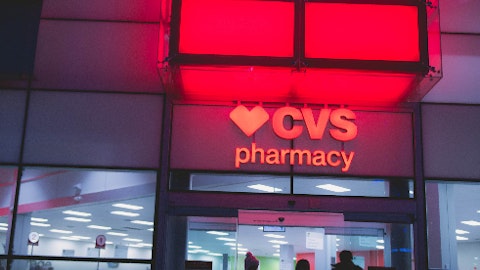Alimera Sciences, Inc. (NASDAQ:ALIM) Q3 2023 Earnings Call Transcript October 26, 2023
Alimera Sciences, Inc. beats earnings expectations. Reported EPS is $-0.06, expectations were $-0.41.
Operator: Ladies and gentlemen, thank you for standing by. Good morning, and welcome to the Alimera Sciences Third Quarter 2022 [2023] (sic) Financial Results and Corporate Update Conference Call. [Operator Instructions] Participants of this call are advised that the audio of this conference call is being broadcast live over the internet and is also being recorded for playback purposes. A webcast replay of the call will be available approximately one hour after the end of the call through January 26, 2024. Now I’d like to turn the call over to Scott Gordon of CORE IR, the company’s Investor Relations firm. Please go ahead, sir.
Scott Gordon: Good morning. Thank you, Nick, and thank you all for participating in today’s conference call. Joining me from Alimera’s leadership team are Rick Eiswirth, President and Chief Executive Officer; and Russell Skibsted, Chief Financial Officer. During this call, management will be making forward-looking statements, including statements that address Alimera’s expectations for future performance or operational results, future financial position, outlook and guidance and time line for achieving positive cash flow. Forward-looking statements involve risks and other factors that may cause actual results to differ materially from those statements. For more information about these risks, please refer to the risk factors described in Alimera’s most recently filed periodic reports on Form 10-K and Form 10-Q, the Form 8-K filed with the SEC today, and Alimera’s press release that accompanies this call, particularly the cautionary statements in it.
Today’s conference call will include references to adjusted EBITDA, which is a non-GAAP financial measure. Please see the explanatory language and reconciliation table located in Alimera’s earnings press release. The content of this call contains time-sensitive information that is accurate only as of today, October 26, 2023. Except as required by law, Alimera disclaims any obligation to publicly update or revise any information to reflect events or circumstances that occur after this call. It is now my pleasure to turn the call over to Rick Eiswirth. Rick, please go ahead.
Rick Eiswirth: Thank you, Scott, and good morning to everyone on the call. I’m excited to share our third quarter results, which demonstrate the leverage created by adding YUTIQ to our portfolio earlier this year. We achieved record net revenue in the quarter of $23.4 million, up 72% over the third quarter of last year, driven by the sales growth of our 2 brands, ILUVIEN and YUTIQ. And importantly, we achieved positive $5.4 million in adjusted EBITDA in the third quarter. In the U.S. segment, we saw third quarter net revenue increases — increased 103% to approximately $18.1 million year-over-year. YUTIQ contributed $8.9 million to the quarter and continues to demonstrate significant growth with end-user demand reaching 1,045 units, an increase of 20% over Q3 of 2022.
ILUVIEN returned to growth with end user demand of 1,146 units for the quarter, an increase of 8% year-over-year. We believe there is a significant opportunity to grow sales of both ILUVIEN and YUTIQ moving forward in the U.S. behind our expanded sales force detailing both products and our other additional field personnel. As we shared in August, our larger team, which represents over an 80% increase in reps detailing YUTIQ and over a 20% increase in reps detailing ILUVIEN began promoting both products in late July. We’re still in the learning curve for our team, all who have taken on a new product. Continued training for both products is very important to our success. We held a launch meeting in July with all field employees and follow-up training in September.
And we plan to continue to provide more medical and sales education in the field to further the knowledge and to increase their value to our customers. I think we will continue to get better across both indications. And this is important because we believe there is a significant opportunity to cross-sell the second product to many physicians that use only 1 of the 2 products today. For example, in the third quarter, only 27% of the accounts ordering, either YUTIQ or ILUVIEN, in the third quarter ordered both YUTIQ and ILUVIEN. This creates a significant opportunity for us moving forward. Turning to our International segment. We reported $5.3 million in net revenue during the third quarter, an increase of approximately 13% year-over-year, driven by a return to growth in Germany and continued strong performance in our other direct markets.
In our direct European markets, we saw a significant end user demand growth of 20.4% over Q3 of 2022. However, end-user demand in our International segment was down 2% for the quarter caused by the rationing of stock by distributor partners during the quarter. As you may have seen, we were pleased to have Jason Werner, who has an extensive background in ophthalmics and significant experience in previous roles in commercial development and corporate strategy, join us as Chief Operating Officer early last month. We’re already increasing our investment in this area and Jason is working with our distributor partners and our manufacturers to improve inventory levels. We do expect to have stocking levels at the distributor partners addressed early in Q1 next year with improvement over the course of Q4.
As we continue to pursue the increased utilization of ILUVIEN and YUTIQ, we expect that the sharing and discussion of additional data with physicians will be a significant driver. We continue to believe that the PALADIN data set including improvement in visual outcomes, reduced treatment burden and control of retinal thickness variability is an excellent marker for our new day study outcomes. As a reminder, the PALADIN study demonstrated that patients with diabetic macular edema to received a single dose of ILUVIEN demonstrated statistically significant improvements in best corrected visual acuity, central subfield thickness and treatment burden at 36 months. As well as demonstrating that the side effect, risk of intraocular pressure can be effectively mitigated when ILUVIEN is used in accordance with its FDA label.
This month alone, at the recent EURETINA meeting in Amsterdam, we had 4 presentations of this data. And in New York, at the Retina Society, we had an additional 4 presentations. Next month, at the American Academy of Ophthalmology in San Francisco, another presentation and 3 posters will highlight the efficacy and safety of ILUVIEN from this study. From a clinical standpoint, we have several ongoing trials designed to further demonstrate the effectiveness of ILUVIEN and YUTIQ. Our over-enrolled NEW DAY study evaluating ILUVIEN’s utility as baseline therapy head-to-head versus the leading anti-VEGF in the treatment of diabetic macular edema has completed enrollment of 306 patients and remains on track with top line data anticipated in the first quarter of 2025.

A close-up of a human hand holding a test tube with a blue liquid, representing the biopharmaceutical company’s research and development of new medicines.
We are actively enrolling patients in our synchronicity study, which is a prospective open-label clinical study evaluating the safety and efficacy of YUTIQ for the treatment of macular edema associated with chronic noninfectious uveitis affecting the posterior segment of the eye and related intraocular inflammation. This is a 2-year follow-up study within an interim top line 6-month efficacy readout anticipated in the third quarter of 2024. Additionally, we’ve completed a moment in the YUTIQ CALM study with 240 eyes. The CALM study is a registry study conducted in collaboration with the Cleveland Clinic, collecting real-world data to better understand the variety of conditions treated with YUTIQ for noninfectious uveitis affecting the posterior segment of the eye.
We expect efficacy outcomes on individual and combined patient cohorts to be presented at medical conferences in 2024. Also with ILUVIEN, we are working with the DRCR Retina Network to support Protocol AL. Protocol AL is a randomized clinical trial, evaluating either intravitreal faricimab injections for ILUVIEN intravitreal implants versus observation and the prevention of visual acuity loss due to radiation retinopathy following plaque radiotherapy. Looking to the future, we are actively evaluating indication expansion opportunities to broaden the number of patients that either ILUVIEN or YUTIQ as long-acting steroid implants can help treat. We look forward to sharing further details in the coming months. And with that update, I’ll turn the call over to Russell to review our third quarter financial results in greater detail.
Russell Skibsted: Thanks, Rick, and hello, everyone. Thanks for joining us today. I am also very happy to report that net revenue was up 72%, to approximately $23.4 million in Q3 2023, which was almost $10 million more than the $13.6 million we reported in the third quarter of 2022. The increase was due to the addition of YUTIQ into our U.S. portfolio, combined with organic growth in ILUVIEN sales in both our U.S. and international markets. Total end-user demand for ILUVIEN and YUTIQ during the quarter was up 233 units to 3,456 units over the 3,223 units for the same period last year. Net revenue in the U.S. increased 103% to approximately $18.1 million in Q3 ’23. This compared to U.S. net revenue of $8.9 million in Q3 ’22. The growth was attributable to growth in ILUVIEN sales year-over-year as well as the addition of YUTIQ.
U.S. end-user demand for ILUVIEN and YUTIQ during the quarter was up 260 units to 2,191 units over the 1,931 units for the same period last year. International net revenue also performed well, increasing 13% to approximately $5.3 million in Q3 ’23. This compared to approximately $4.7 million in the third quarter of last year. Growth in revenue was due to the increased sales in our direct markets, as Rick alluded to, where we receive higher net revenue per unit. International end-user demand for ILUVIEN during the quarter was down 27 units to 1,265 units over the 1,295 units for the same period last year. Total operating expenses were approximately $18.8 million for Q3 ’23, which compared to $15.0 million in the same period last year. This increase was primarily due to the increased operating costs associated with the addition of YUTIQ in the U.S. segment, and depreciation and amortization associated with the assets acquired.
We received record adjusted EBITDA of $5.4 million in the quarter. This compared to an adjusted EBITDA loss of $2.5 million in Q3 ’23. As of September 30, 2023, we had cash and cash equivalents of approximately $8.3 million compared to $18.8 million on June 30, ’23. Cash burned during the quarter was primarily a result of working capital investments required to support the addition of YUTIQ during the quarter. What this means is that in May, we began paying all of the expenses for YUTIQ but because of the payment terms with the distributors, we did not begin collecting on those sales that we made until this month. We expect to generate positive cash flow in the fourth quarter of ’23 and in 2024. With that, I will now hand the call over to Rick so he can give his closing comments.
Rick?
Rick Eiswirth: Thank you, Russell. I commented on our last call that we are committed to leveraging our existing U.S. commercial infrastructure to achieve sustainable positive EBITDA beyond this year. This quarter was solid evidence that our strategy is working. We are also committed to growth and to support the significant revenue opportunities provided by both ILUVIEN and YUTIQ. In 2024, we will look to leverage our broader commercial team and stronger financial position to increase our engagement with retina specialists, leverage the cross-selling opportunity presented by having 2 products and indications and drive utilization of both products. As I noted earlier, we will evaluate indication expansion opportunities for our long-acting steroid implant to help more patients.
This quarter was the first step in establishing a foundation to achieve our goals next year and we are reiterating our expectation to generate more than $100 million in revenue next year and at least $20 million of adjusted EBITDA in 2024. We will endeavor to update our revenue and EBITDA guidance as we progress through the integration and planning for 2024 with a goal to improve these targets. This concludes our prepared remarks, and I’ll now turn the call over to the operator for questions.
Operator: Thank you. [Operator Instructions] First question will be Alex Nowak, Craig-Hallum.
See also 20 Most Searched Stocks on Google and 25 Largest Economies in the World by 2030.
Q&A Session
Follow Alimera Sciences Inc (NASDAQ:ALIM)
Follow Alimera Sciences Inc (NASDAQ:ALIM)
Receive real-time insider trading and news alerts
Alex Nowak: Good morning, everyone. Thanks for doing the call here. That 27% cross-sell number that you mentioned in the prepared remarks, where can that realistically go by the end of the year. I think that’s a really important metric here as you complete the combination of the 2 assets.
Rick Eiswirth: Alex, I mean that’s a really hard one to project. I mean I will say it’s up a point or 2 since we took over the both products. So I think you’re certainly seeing some impact there early, but I wouldn’t expect to see major strides of that until we get into next year as we continue to get the entire team cross-trained really well across both products.
Alex Nowak: The next year with all that’s kind of trading in place, then we can start to see that number climb up.
Rick Eiswirth: That’s right.
Alex Nowak : Maybe expand a little bit on the OUS weakness there. I know you touched on it during the prepared remarks, but I was surprised seeing the OUS units decline quarter-over-quarter in such a dramatic fashion. Just expand on what was happening in the — over in Europe this quarter?
Rick Eiswirth: Yes, sure. So as we talked a little bit about on the second quarter call, we have been a little bit behind in supplying some of the distributors in Europe. That’s a factor of demand increasing in our other markets. And frankly, the early forecasting in the first part of the year from the distributor partners was — and late last year was lower than expected, and we just have a long lead time product for manufacturing. So we actually were really pleased with the demand growth in the direct markets. As we noted, they were up over 20%, I think 20.4%. What happens in some of the markets in Europe is if they are low on stock they have to ration the units going out so that they don’t go out of stock. And so our partners in France specifically has had to, based on working some things out with the regulatory authorities, lower the number of units that they’re shipping each quarter in order to just maintain an in-stock position.
And so that’s what I mean by rationing that. So we do expect that to have a significant uptick back to levels they were at before once their stock is built up. And as I said in my prepared comments, we’re working closely with them to rebuild stock over the course of the fourth quarter and think we’ll be back to the point where they’ll be fully stocked in Q1.
Alex Nowak: That makes sense. With regards to the U.S., we had some choppiness in the past couple of quarters with docs trialing new drugs, and that was essentially slowing the rate that they’re moving over to ILUVIEN. Just thoughts on longer-lasting VEG — anti-VEGF drugs, the thoughts on how docs are trialing, retina docs are trialing new drugs out there. It seems like that has reversed this quarter. Is that fair to assume?
Rick Eiswirth: Yes, a little bit of it. I mean, I do think the trial of faricimab out there is still a formidable. It’s a challenge to us as we go forward. But I think the reality is doctors are learning as they trial faricimab that it is — and this isn’t saying anything neat, everybody — it is — anti-VEGF is a class of drug, right? And the reality is that there are patients out there that need something more than anti-VEGF therapy. It’s been demonstrated in DRCR protocols that there’s persistent edema in these patients even they receive recurring and very tightly spaced doses of anti-VEGF therapy. So I think we will work through that. But the use of faricimab is still pretty aggressive now. But there’s still a need for the steroid to take the place of those anti-VEGF in certain patients.




